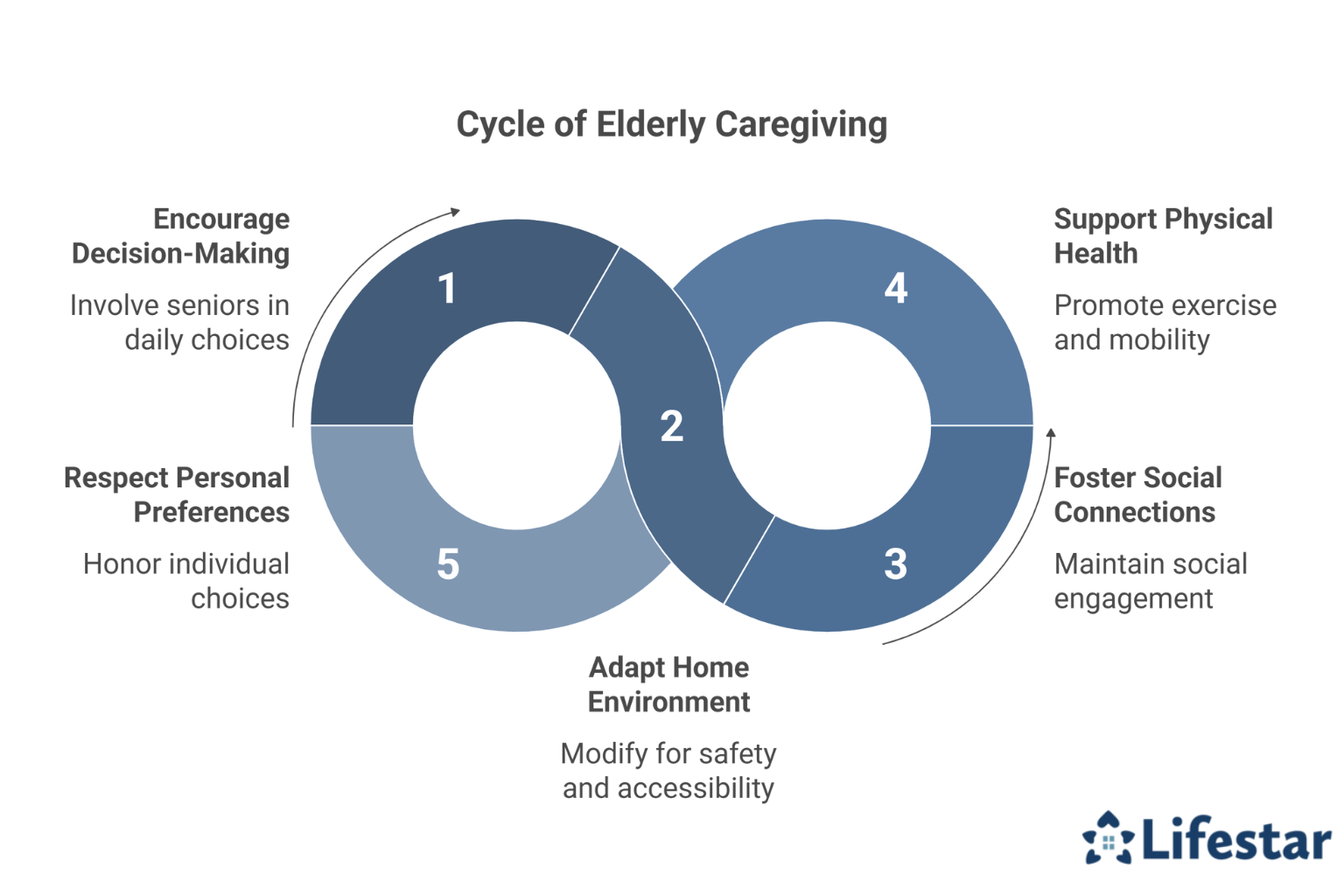
Table of Content
Maintaining independence becomes increasingly challenging as seniors age, but thoughtful caregiving approaches can preserve autonomy while ensuring safety. Effective caregiving balances necessary support with respect for personal choice and dignity. The key lies in empowering your senior loved one to maintain control over his or her daily life while providing assistance that enhances rather than replaces his or her capabilities.
Encourage Decision-Making in Daily Activities
Supporting independence starts with involving your loved one in everyday choices, from meal planning to clothing selection. Rather than making decisions for your loved one, present options that allow him or her to exercise personal preference while staying within safe parameters.
Create structured choices that feel meaningful:
- Offer two or three meal options instead of preparing food without input.
- Present weather-appropriate clothing choices for daily selection.
- Include your loved one in scheduling appointments and social activities.
- Ask for preferences regarding daily routines and timing.
When cognitive changes affect decision-making abilities, simplify choices without eliminating them entirely. A senior with mild memory loss might have difficulty with complex decisions but can still choose between two restaurant options or select which television program to watch.
Document preferences and patterns to maintain consistency. If your loved one consistently prefers morning showers or afternoon walks, build these preferences into care routines. This approach honors your loved one’s autonomy while providing necessary structure and support.

Adapt the Home Environment for Safety and Accessibility
Environmental modifications can dramatically extend a senior’s ability to live independently while reducing safety risks. Focus on changes that enhance function without creating institutional feelings or eliminating personal belongings that provide comfort and identity.
Install safety features that blend seamlessly with existing décor:
- Add grab bars in bathrooms using decorative styles that match fixtures.
- Increase lighting in hallways, stairways, and frequently used areas.
- Remove tripping hazards like loose rugs while maintaining familiar furnishings.
- Organize frequently used items within easy reach to reduce stretching and bending.
Technology solutions can enhance independence significantly. Medication dispensers with alarms help seniors manage prescriptions safely. Emergency alert systems provide peace of mind for both seniors and caregivers. Smart home devices can control lighting, temperature, and entertainment systems through simple voice commands.
Consider your loved one’s comfort level with new technologies. Some embrace helpful gadgets enthusiastically, while others prefer traditional approaches. Introduce changes gradually and provide patient instruction to build confidence with new systems.
When considering senior care, families should make sure their senior loved ones have the resources they need to maintain their independence and remain healthy. Trusted in-home care professionals can assist seniors with daily tasks like cooking, bathing, and exercise, and they can also encourage them to focus on healthier lifestyle habits.
Foster Social Connections and Community Engagement
Social isolation threatens senior independence by reducing motivation, cognitive stimulation, and emotional support. Maintaining connections with friends, family, and community provides essential mental health benefits while creating networks that support continued independence.
Transportation often becomes the primary barrier to social engagement. Address this challenge through multiple approaches:
- Research senior transportation services in your community.
- Coordinate carpools with friends or neighbors.
- Explore ride-sharing options designed for seniors.
- Investigate virtual social opportunities when physical travel becomes difficult.
Encourage participation in activities that match interests and abilities. Senior centers, religious organizations, volunteer opportunities, and hobby groups provide structured social interaction. Many communities offer programs specifically designed for seniors with varying mobility or cognitive levels.
Support existing friendships by helping your loved one maintain regular contact. This might involve setting up video calls with distant relatives, organizing visits with longtime friends, or facilitating participation in established social groups. Long-term relationships provide continuity and emotional support that enhance overall wellbeing.
Support Physical Health and Mobility
Physical independence relies heavily on maintaining strength, balance, and mobility. Encourage regular movement and exercise appropriate for individual capabilities while respecting limitations and safety concerns.
Work with healthcare providers to develop safe exercise routines. Physical therapists can recommend specific exercises that address balance, strength, and flexibility. Many communities offer senior-focused fitness programs led by qualified instructors who understand age-related physical changes.
Create opportunities for movement throughout daily routines:
- Encourage short walks or outdoor time when weather permits.
- Suggest household tasks that provide gentle physical activity.
- Support participation in activities like gardening, dancing, or swimming.
- Promote stretching or chair exercises during television viewing.
Monitor changes in physical capabilities without being overprotective. Gradual decreases in strength or balance might require equipment modifications like shower chairs or walking aids, but these tools can actually extend independence when introduced appropriately.
Address vision and hearing concerns promptly, since sensory changes directly impact safety and independence. Regular eye exams, proper lighting, and hearing aid maintenance help seniors navigate their environments confidently.
Not every senior has the same care needs, which means they don’t all need the same type of home care. Oklahoma City families can rely on Lifestar Home Care to provide individualized care plans to meet their elderly loved ones’ unique care needs. Our caregivers help seniors focus on healthy lifestyle habits such as eating nutritious foods, exercising regularly, and maintaining strong social ties, and we offer mentally stimulating activities that can boost cognitive health and delay the onset of dementia.
Respect Personal Preferences and Autonomy
True independence preservation requires honoring individual preferences, even when they differ from caregiver opinions. Seniors have lived full lives and developed strong preferences about everything from food choices to daily schedules. Respecting these preferences demonstrates dignity and maintains personal identity.
Distinguish between safety concerns and personal preferences. A senior who refuses to use a shower chair might benefit from education about fall risks, but someone who prefers coffee over tea doesn’t need intervention. Learn to identify situations that truly require caregiver involvement versus those where personal choice should prevail.
Communicate respectfully about necessary changes. When safety modifications become essential, explain the reasoning and involve your loved one in selecting solutions. This collaborative approach maintains dignity while addressing legitimate concerns.
Accept that some independence involves calculated risks. A senior who insists on continuing to cook might benefit from safety modifications like automatic shutoff devices rather than complete cooking restrictions. Balance protection with quality of life considerations that honor individual values and priorities.
Living independently is important for seniors who want to maintain a high quality of life. For some, this simply means receiving help with tasks that have become more challenging to manage over time. Even when families have the best intentions, they may not have the time to provide the care their elderly loved ones need and deserve. If your loved one needs help for a few hours a day or a few days a week, reach out to Lifestar Home Care, a trusted provider of respite care Oklahoma City seniors can depend on. Trust your loved one’s care to the professionals at Lifestar Home Care. Reach out to one of our compassionate Care Managers today.